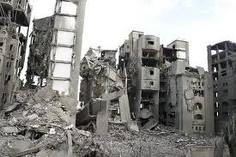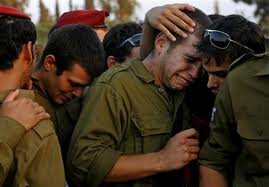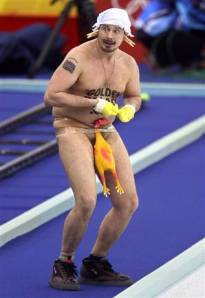The great revolutionary anarchist, Mikhail Bakunin wrote, “I am properly free when all the men and women about me are equally free…”1 I thought for a good period that Bakunin must be a severe sentimentalist. Clearly, this is not correct; lock up the criminals and I’ll be safe. However, of late, through consideration of the Jewish occupation of Palestine, I’ve grasped in this phrase a great depth and wisdom. Although the dreadful predicament of the Palestinians is rightfully discussed in progressive writings, there exists a curious self-enthrallment in Israeli society. But first, reflect that George Orwell once shot an elephant.
As a young policeman in 1920’s Burma, Orwell was called out one afternoon deal with an aggressive bull elephant that had pulled free of its restraints, was destroying property, and had trampled an unfortunate Indian coolie. With elephant gun in hand, he trotted off to find the beast with thousands of Burmese villagers scurrying in tow eagerly awaiting the inevitable showdown. At last, Orwell discovered the animal among some muddy rice patches peaceably munching grasses with a touching “grandmotherly air.” At this point, Orwell writes that he had no desire to “murder” it knowing that its owner was just some hours away. Yet he was fixed on an unalterable course:
And suddenly I realized that I should have to shoot the elephant after all. The people expected it of me and I had got to do it; I could feel their two thousand wills pressing me forward, irresistibly. And it was at this moment, as I stood there with the rifle in my hands, that I first grasped the hollowness, the futility of the white man’s dominion in the East. Here was I, the white man with his gun, standing in front of the unarmed native crowd – seemingly the leading actor of the piece; but in reality I was only an absurd puppet pushed to and fro by the will of those yellow faces behind. I perceived in this moment that when the white man turns tyrant it is his own freedom that he destroys.
Israel’s crimes trample through our conscious these days while the corporate press, through momentum of habit, attempt to cast the state of Israel as an unfortunate victim acting from the position of mere defence. Like children who hide their faces under blankets and trust the scary world does not exist, our media agents wrap their heads in newsprint and wish the internet into oblivion, that nasty virtual world where anyone interested in facts can read human right reports like the one that B’Tselem recently issued.
One and a half million Gazans live in “severe poverty.” Ninety-five percent of their factories are shut down. Ninety eight percent of the residents suffer from regular electrical blackouts while the other two percent have no electricity to lose. Ninety three percent of their water wells are polluted. Approximately 20,000 were left homeless, 5300 wounded, and 1390 killed by the Israeli military attack on them 27 December 2008 to 18 January 2009 while just twelve Israelis were killed in that assault (4 of them from friendly fire.)
Meanwhile in the much larger West Bank, Israel has confiscated tens of thousands of acres of Palestinian land which has been subsequently settled by some 310,000 Jews transferred from Israel proper. The infamous security/apartheid fence/wall snakes around many of these settlements to make the land grab more permanent. Palestinians suffer restricted movement due to more than 500 checkpoints and roadblocks where soldiers have committed hundreds of incidents of abuse while the State gives a little wink of its blind eye. Tyranny it is. And yet, when the Jewish man turns tyrant, he too destroys his own freedom.
Amira Hass, Israeli journalist and winner of journalism and human rights awards, writes that most Israelis, “have given up on real information” as they refuse to understand the shocked response of some people in the world to the treatment of the Palestinians. And, to be sure, Hass knows what she is talking about having recently lived in Gaza for some months –only to be arrested on her return to Israel on charges of criminally residing in an enemy state. Can a nation call itself free when it breeds such a disdain for information that it will persecute its journalists in this manner?
Writer Ilan Pappe likens Israel, with its colonist policies, to a settler Prusian state, and provides first-hand knowledge of the “socialisation and education” that someone born in Israel receives. Israeli Jews are subjected to a “militarisation of the mind” and a domination by the army over political, cultural and economic life. Ex-military man and Israeli peace activist, Uri Avnery, refers to the “addiction of our leaders to the use of force.”
Such views of Israel depict this nation as a military state, indoctrinating its citizens with its military propaganda, slamming journalists, and abusing human rights. This cannot be right; surely Israel is a democracy, a singularly free nation in that region!
Anthropologist, author, and activist Jeff Halper puts a big question mark on this categorization. He frankly says, that Israel is, in fact, an ethnocracy, not a democracy, where the 70% of the Israelis who are Jewish own the country. And then there is the apartheid wall which further erodes any democratic credentials because “You can’t have a democracy here and an occupation there.” This ethnocracy was certainly on display quite recently when Members of the Knesset (MK) accosted MK Haneen Zoabi, tossed her out of the parliamentary chamber, and revoked various of her parliamentary privileges. Zoabi is, of course, an Arab Israeli. “I thought, this couldn’t be a parliament, these are just gangsters,” she remarked later.
But these parliamentary members are a product of the country and an unhealthy society. Halper says that “The occupation permeates ever single aspect of their lives.” And the result is a rise in alcoholism and domestic violence, and of a high suicide rate among soldiers and police. Canadian author, Margaret Atwood, calls this permeation “The Shadow.” The Shadow, or “the situation” as it is more commonly called, is Israel’s treatment of the Palestinians; it makes its appearance two minutes into any conversation and “haunts everything.” As Avnery writes: “Violence is a symptom; the occupation is the disease – a mortal disease for everybody concerned, [both] the occupied and for the occupiers.”
Orwell ends his exposition on shooting an elephant with the phrase, “I often wondered whether any of the [other English police personnel] grasped that I had done it solely to avoid looking a fool.” But the whole English empire was eventually made to look the fool when Gandhi sent it packing. The Americans looked the fool when they were forced out of Vietnam, as the Russians looked the fool when pushed from Afghanistan. The sooner Israel looks the fool, the sooner it ends the occupation, the better for all concerned, Palestinians and Jews alike.
1 A. Lehning, 1973, “Michael Bakunin: Selected Writings” page 146





